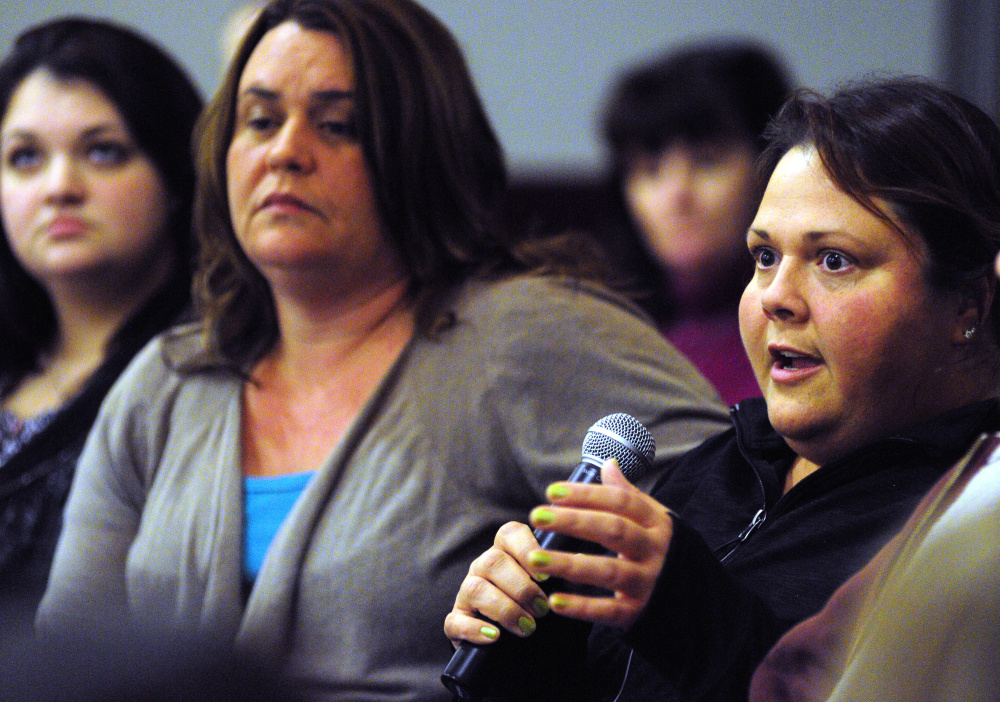AUGUSTA — The Riverview Psychiatric Center faces an alarming staffing calamity, and state lawmakers and administration officials should move quickly to address the problems, two capital city legislators said Wednesday.
Those reactions from Sen. Roger Katz, a Republican, and Rep. Donna Doore, a Democrat, came after a forum Tuesday night at which Riverview workers voiced concerns that the dwindling staff at the state mental health hospital was being overworked with mandated overtime shifts, placing them and patients in danger.
Katz said he spoke with Wednesday with Department of Health and Human Services Commissioner Mary Mayhew about the staffing shortage at Riverview.
“She understands and agrees that we need to do everything we can to get those positions filled as quickly as possible,” Katz said Wednesday. “The question is: Are there more things that the superintendent, the commissioner and also the administration can be doing to get to where we need to be? One thing I came away with last night was we can’t approach this in a leisurely way; Rome is burning.”
Doore said Wednesday she was amazed at the staffing problem “and almost overwhelmed to think those people who were there and those who couldn’t come are so dedicated.”
“I was taken aback to hear their stories and know how extreme it was,” Doore said. “It doesn’t appear they are getting a whole lot of support from the management, apparently. From what we heard last night, it’s not safe for the employees and it’s not safe for patients.”
The Legislature’s Government Oversight Committee is scheduled to hear Friday morning about the Riverview staffing problems from Mayhew, Riverview Superintendent Jay Harper and Court Master Daniel Wathen. The session is to begin at 9 a.m. in Room 220 of the Burton M. Cross State Office Building.
“The administration is constantly working to fill vacant positions — in the past few weeks 29 positions have been filled,” Samantha Edwards, a spokeswoman for the Department of Health and Human Services, said via email Wednesday. “We continue to hire qualified employees as we interview them. Once we get a critical mass of staff on board, some of the issues voiced last night will be alleviated.”
She said the hospital has 372 employees, including people who work on Riverview outpatient teams.
The federal Centers for Medicaid and Medicare Services agency, which oversees Riverview funding, found numerous problems during an audit, including the use of stun guns, pepper spray and handcuffs on patients; improper record-keeping; medication errors; and failure to report progress made by patients. As a result, the hospital lost eligibility for federal reimbursement of about $20 million annually, though state officials say they are developing plans for Riverview to be re-certified this year.
Staffing shortage concerns voiced Tuesday night by Riverview workers echo those raised in November by a consultant evaluating the hospital for the court master.
The court master, Wathen, oversees a consent decree governing how the state must treat people with mental illness. Consultant Elizabeth Jones, who spent three days at the state-run hospital last September, says in the report to Wathen, “During the site visit, it was obvious that staffing on the units is not stable.”
Among her concerns were that acuity specialists “specifically hired to supplement staffing during especially difficult or potential periods of crisis on the units, are serving as direct support staff, in lieu of trained mental health workers.”
Acuity specialists are workers specially trained to handle patients with a history of dangerous behavior. Riverview is a 92-bed hospital split between civil and forensic units and housing some patients who have proved to be particularly dangerous and difficult to handle, some of whom have been found not responsible for crimes because of their mental health problem.
At the forum held Tuesday at the University of Maine at Augusta, where Riverview workers listed their concerns about the hospital, Jodi French, who was a mental health worker and now is an acuity specialist, said when she’s asked to also do mental health work on the floor, “it confuses the patients.” French said she frequently volunteers to work additional shifts to avoid being mandated to do so, but added that leaves people exhausted.
“You always have to be at the top of your game at Riverview,” she said.
Katz, who helped organize the forum, said he was pleased that members from four legislative committees — Appropriations, Health and Human Services, Criminal Justice and Public Safety, and Judiciary — attended, given that those committees all handle Riverview issues to varying degrees.
Katz said he was impressed with the workers’ dedication to patient care and the workers’ focus on what understaffing means for the patients.
“It’s also obvious that morale is very low and that the problems with mandated overtime are starting to impact many of these people and impact their health,” he said. “We’ve got to do better than that.”
The report from consultant Jones notes that traveling or temporary nurses are being used to meet nursing mandates, temporary or part-time practitioners fill vacant psychiatry posts and voluntary and mandated overtime is used to meet minimum staffing standards.
Jones quoted figures provided by Riverview, showing that mental health workers clocked 1,102.75 overtime hours in July, 224 hours of that mandated; and 1,083.5 hours in August 2015, with 312 hours mandated.
Nurses, too, saw overtime of 462.75 hours in July, with 16 hours of that mandated and 337.5 hours in August 2015, with eight hours mandated.
Mandated shifts can be four hours or eight hours long, workers said. Those who worked day shifts described dreading the 3 p.m. phone calls mandating them to stay because the next shift was short of workers.
“If they volunteer to take a shift, they don’t get mandated. They can plan and have a little more control over their lives,” said Mary Anne Turowski, political and legislative director at the Maine State Employees Association SEIU Local 1989, which represents some 175 people working at Riverview. Those represented workers include nurses, social workers, doctors, psychiatrists and acuity specialists as well as maintenance and those in outpatient support personnel.
Asked Wednesday how many positions should be added to fix the staffing shortage and avoid mandates and overtime, she said, “We can’t say what the magic number is.”
While the hospital currently attempts to fill 19 nursing posts, she said it would make sense to hire a greater number since some people could be leaving to go elsewhere or retiring.
Turowski said hourly pay for acuity specialists ranges from $14.88 to $19.88 and goes through a number of steps that coincide with date of hire and performance appraisals.
“Very few (acuity specialists) are at the higher end, because it’s a new position,” Turowski said. She also said that in addition to the base rate, they could be receiving institutional supplements and shift differentials, as can a number of other positions at the hospital.
Pay for a nurse III or charge nurse at the hospital, the predominant R.N. job class at Riverview, ranges from about $26.15 to $32.40 hourly and includes recruiting and retention stipends.
“These rates may be comparable to other hospitals like MaineGeneral or Togus, but the overtime hours and working conditions far outweigh the rates of pay,” Turowski said in an email Wednesday. “If you can go work at another facility for a similar rate of pay but are able to get home to your family after an eight-hour shift, safe and uninjured, most people would choose the safer job rather than (Riverview).”
On Tuesday, one nurse suggested mimicking shifts at other hospitals where nurses work three 12-hour days a week and have the rest of the week off rather than the traditional eight-hour, five-day-per-week shifts currently in place at Riverview.
Laura Fisher, president of AFSCME 1814, and a mental health worker at Riverview for almost three decades, offered some stark figures of the worker shortage to a legislative committee last March when she advocated for 12 new mental health worker posts at the hospital.
“The amount of money that the state of Maine is currently paying for OT/Mandate hours at the rate of one and (a) half times would certainly pay for new positions,” she said in her testimony. AFSCME represents about 110 workers at Riverview.
Fisher listed 5,076 hours of overtime for mental health workers from Jan. 1 to March 3, 2015, and noted that in one particular week, they needed “to fill 81 mental health worker shifts. That is 16 full-time mental health worker positions.”
Pay for a mental health worker I ranges from $11.91 to 15.29 per hour, with up to $2.50 additional available for special certifications and direct care work.
Edwards, the DHHS spokeswoman, said Wednesday that more recent overtime figures were being gathered but were unavailable.
Betty Adams — 621-5631
Twitter: @betadams
Send questions/comments to the editors.






Success. Please wait for the page to reload. If the page does not reload within 5 seconds, please refresh the page.
Enter your email and password to access comments.
Hi, to comment on stories you must . This profile is in addition to your subscription and website login.
Already have a commenting profile? .
Invalid username/password.
Please check your email to confirm and complete your registration.
Only subscribers are eligible to post comments. Please subscribe or login first for digital access. Here’s why.
Use the form below to reset your password. When you've submitted your account email, we will send an email with a reset code.